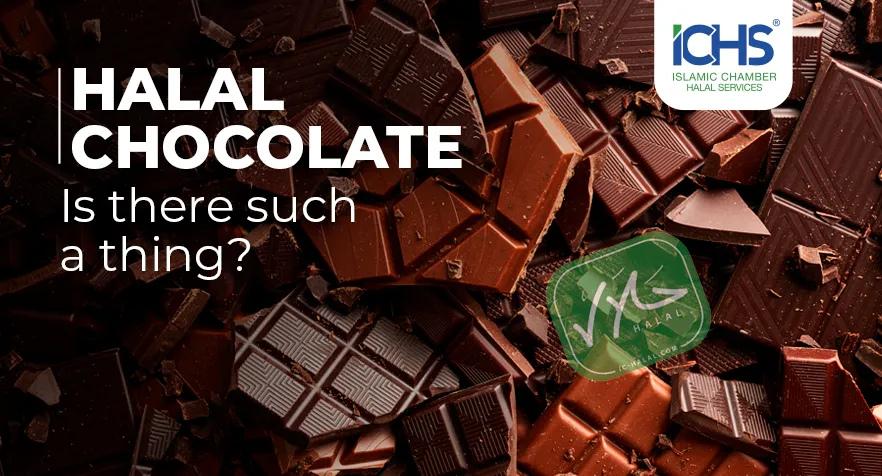Halal Chocolate: Is there such a thing?
Digging into a bar of chocolate is a universally cherished experience that brings joy and delight to people of all ages and backgrounds – who DOESN’T love this sweet, velvety delicacy? Be it in cakes, bakes, treats, hot and cold beverages, or even given as a gift on a special occasion or as a gesture of kindness; chocolate in all its forms, brings the ultimate joy.
By Muslim standards – particularly where gifting is concerned – the avoidance of alcohol-laden chocolates is the standard strategy, and by that, we often think we’ve done all we can from a halal-perspective.
That may not exactly be the case. It turns out there are a few more things to consider when ensuring the universal-favorite is 100% halal.
Read More | Halal Cosmetics
What are the basic ingredients of Halal Chocolate?
For those who follow the Islamic faith, the concept of halal plays a significant role in their dietary choices. Halal, meaning “permissible” in Arabic, refers to food and beverages that are prepared according to Islamic guidelines.
To qualify as halal, chocolate must contain ingredients that are permissible according to Islamic dietary laws. The primary components of chocolate—cocoa, sugar, milk, and various flavorings—can all be halal if sourced correctly.
Cocoa: The cocoa beans used in halal chocolate should be free from any non-halal additives or processing aids. This means avoiding ingredients like alcohol-based flavorings or extracts derived from non-halal sources.
Sugar: Sugar is a staple ingredient in chocolate, and it must be sourced from permissible sources. Generally, sugar derived from sugarcane or beet is considered halal. However, if sugar undergoes processing involving non-halal substances, it may lose its halal status.
Milk: Milk chocolate contains dairy products, and to be considered halal, the milk used must come from halal-certified farms. Additionally, any additional ingredients, such as emulsifiers or stabilizers, should also adhere to halal standards.
Flavorings: Flavorings in halal chocolate must be free from any non-halal substances. Manufacturers need to ensure that natural or artificial flavorings used do not contain alcohol or other prohibited ingredients, such as pork-based gelatines or flavorings.
By carefully selecting and sourcing these ingredients, chocolate manufacturers ensure that their products meet the requirements for halal certification.
How can I be sure that my favorite chocolates are Halal?
Enter the importance of Halal Certification on your labels! While popular chocolate bars are generally halal, especially those with ingredients limited to cocoa mass, cocoa solids, and cocoa butter, looking for the halal certification on your chocolate bars ensures that it’s 100% halal compliant. A Halal certification ensures that the chocolate production process adheres to specific these Islamic requirements. These guidelines encompass various aspects, including the sourcing of ingredients, manufacturing processes, and quality control. Halal certification organizations, through meticulous inspections and audits, ensure that the entire supply chain, from cocoa bean to the finished product, meets the necessary standards.
By obtaining halal certification, chocolate manufacturers demonstrate their commitment to providing Muslim consumers with products that align with their religious beliefs. This certification instills confidence and trust in the authenticity and integrity of the chocolate, allowing Muslims to enjoy their favorite treat without any concerns whatsoever.
Halal Chocolate: A Global Market
In response to the growing demand for halal chocolates worldwide, numerous brands have taken extra steps to obtain a halal certification for their products – that’s why you’ll find plenty of your favorite chocolates have a halal certification mark near the ingredients on the packaging. When browsing the aisles, it’s important to look for the distinctive halal certification logo mark on the packaging, as it guarantees the authenticity of the chocolates as halal.

Halal chocolate is not limited to specific geographic regions. It is enjoyed by Muslims all over the world, from the Middle East to Southeast Asia, Europe, and beyond. With a wide range of flavors, textures, and forms available, halal chocolate offers a delectable experience for chocolate lovers, regardless of their cultural or religious background.
In addition to meeting the halal requirements, many halal chocolate producers emphasize ethical and sustainable practices. This includes sourcing cocoa beans from farmers who follow fair trade principles, ensuring workers’ rights and fair compensation, and supporting environmentally friendly cultivation methods.
By choosing halal chocolate, consumers can savor their favorite treats while contributing to a more equitable and sustainable cocoa industry.
So, the next time you savor a piece of halal chocolate that’s been marked with a sign of certification, relish in the knowledge that you’re not only enjoying a delicious treat but also embracing a confectionery delight that upholds the principles of halal.




